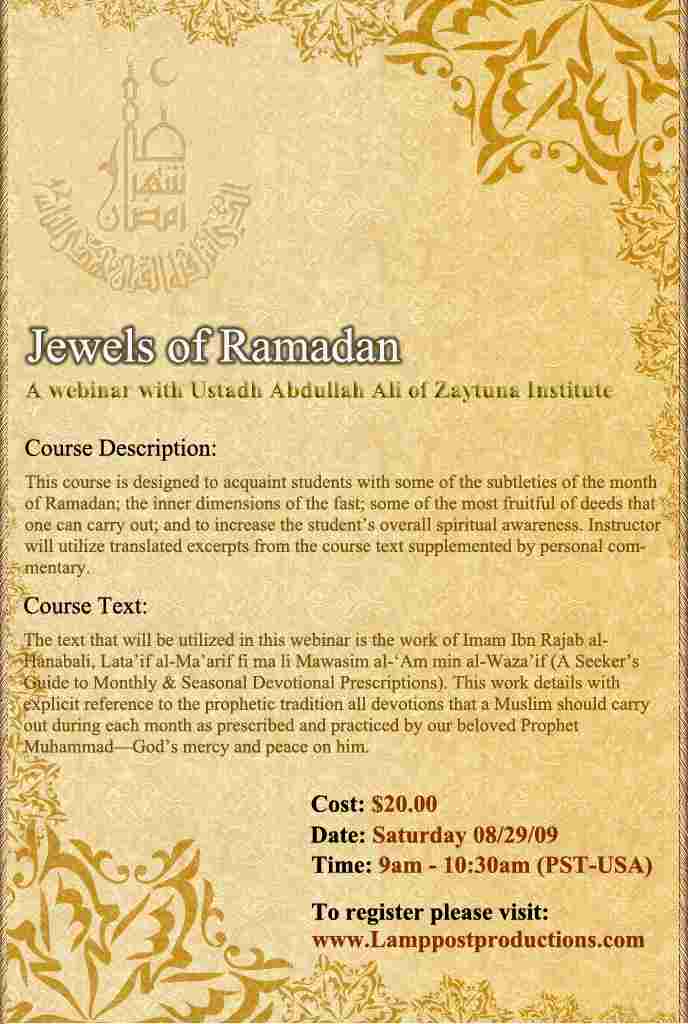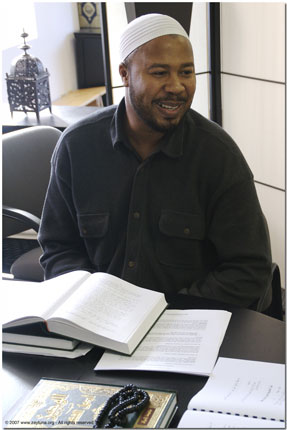A resource of quotes and links relating to belief, practice and realization; Islam and Muslims in the United States...and other matters of interest
Friday, August 21, 2009
"O you who believe! Fasting is prescribed for you.."
the Opening of the Qur'an
The following is from the beginning of Cleary's translation of the Qur'an. [Cleary in 1993 published a selection of passages in his beautiful the Essential Koran. In 2004, he came out with a full translation (although with not introduction or footnotes) with Starlatch Press. See if you like it:]
1. The Opening
1. In the name of God,
the Benevolent,
the Merciful.
2. Praise is proper to God,
Lord of the universe,
3. the Benevolent,
the Merciful,
4. Ruler of the Day of Requital.
5. It is you we serve,
to You we turn for help.
6. Show us the straight path,
7. the path of those You have favored,
not of those who are objects of anger,
nor of those who wander astray.
2. The Cow
In the name of God, the Benevolent, the Merciful
1. A.L.M.
2. This is the Book, without doubt,
in it guidance for the conscientious,
3. those who believe in the unseen,
who practice regular prayer,
and who give of what
We have provided them;
4. and those who believe
in what was revealed to you,
and what was revealed before you,
and are certain of the Hereafter
5. They follow guidance from their Lord;
and they are the successful ones.
6. As for those who scoff,
it is the same to them
whether you warn them or not -
they do not believe.
7. God has sealed their hearts,
and their hearing and their seeing
are covered over;
and there is a horrendous torment for them.
II.
8. And there are people who say,
"We believe in God and the Last Day,"
but they do not believe.
9. They try to deceive God
and those who believe,
but they only deceive themselves,
without being aware.
10. In their hearts is sickness,
and God has made them sicker;
and in store for them is painful torture,
because they have been lying.
from "The Qur'an A New Translation" by Thomas Cleary
E-baad-e News
1st Night of Ramadan by Shaykh Abdul-Kareem Yahya
In the Name of Allah, Most Merciful and Compassionate
Praise is for Allah, Lord of the Worlds
May Allah bless and grant peace to our liegelord Muhammad as well as his folk and companions
Dear brothers and sisters from the nation of our beloved Prophet Muhammad (peace be upon him),
As we wait in eager anticipation of the noble guest who approaches, the blessed month of Ramadan in which the Quran was revealed, we undoubtedly are making physical and spiritual preparations therefore.
Among the preparations that the scholars of Islam have encouraged is preparing our hearts for Allah's gaze. Baihaqi relates, “When it is the first night of the month of Ramadan, Allah, Mighty and Majestic, gazes to them and the one to whom Allah looks, He does not punish him, ever.” The place to which Allah looks is the heart. So what will Allah see in your and my heart if He were to look to us on the first night of Ramadan?
One of the qualities that would prevent us from this blessed gaze (and from many other opportunities for forgiveness) is malice. The Prophet, May Allah bless him and grant him peace, taught us of the Night of Power and the Half Night of Sha’ban that those who harbor rancor, mistreat parents, severe bonds of kinship or drink are prevented from Allah’s merciful gaze. Do we want Allah to look to His servants on the first night of Ramadan and overlook us because we are bearing ill will against each other? Is whatever anyone has done to hurt us so important that we can not overlook it in exchange for an opportunity for eternal salvation from Allah's punishment? What about all of those whom we have wronged? Do we not need Allah's pardon as well as theirs?
We can purify our hearts in preparation for this gaze from our Merciful, Forgiving Lord and also expose ourselves to an opportunity for His pardon when we need it most, by pardoning His servants. Allah said, "The one who pardons and reconciles his reward is upon Allah;" Quran (42:40). Tabarani relates that the Prophet, may Allah bless him and grant him peace, said, "A caller will call [on the Day of Rising], ‘Let him stand whose reward is upon Allah and let him enter paradise’ Then he will call a second time, ‘Let him stand whose reward is upon Allah and let him enter paradise’ It will be said, ‘Who is the one whose reward is upon Allah, Mighty and Majestic?’ He will say, ‘Those who pardon people.’ Then he will call a third time, ‘Let him stand whose reward is upon Allah and let him enter paradise.’ Then so and so many thousand will stand and enter paradise without reckoning." Imagine being among that fortunate group and having all of our many sins forgiven and receiving our reward directly from Allah!
In preparation for the blessed first night of Ramadan, Insha'Allah, and that day in which each of us will meet Allah, let us pardon one another and all of Allah's servants. I will begin with my own sinful self. O Allah, if any of Your slaves have transgressed the rights You have prescribed to me, they are excused. I ask you to grant them and me Paradise, and that You make us among its dwellers whom You have described in Your saying, "We have removed what was in their breasts of rancor, brethren on couches facing one another;" Quran (15:47). I also ask anyone who I have wronged to seek their due from me and to forgive me.
“Our Lord forgives us and our brethren who preceded us in faith and do no place in our hearts ill will towards those who believe. Our Lord, indeed you are compassionate and merciful.” Quran (54:10)
And Allah alone grants tawfiq (success),
Abdul-Kareem Yahyaa
[Re-posted here with permission]
Thursday, August 20, 2009
Imam Abdul Latif's blog
E-baad-e News
Wednesday, August 19, 2009
Special Online Seminar for Ramadan with Shaykh Abdullah Ali
| ||||
| ||||
Monday, August 17, 2009
"The souls are assembled hosts, those that recognize each other find harmony..."
"Various narrations have been related that give us insight into the heart. Among them is the saying of the Messenger of God, peace upon him, "Verily, amongst the believers are individuals my heart softens towards." [footnote 252: Ahmad, Musnad, no. 22299)
Our hearts respond differently to different people. There are people that we instinctively find repulsive and there are others we have a great receptivity towards. One reason for this is the nature of the interaction of our souls with other souls in the pre-temporal realm before entering this world. This process is described by the Messenger of God, peace upon him, in the following hadith, "The souls are assembled hosts, those that recognize each other find harmony, while those that are unfamiliar with each other find dissonance." [footnote 253: Bukhari, no. 3336]
Ibn Hajar al-Asqalani mentions in Fath al-Bari that Imam al-Khattabi understood this to mean two things: People's souls are naturally disposed towards good or evil and when they meet those souls that are similarly inclined they gravitate towards each other, the good souls toward the good, the evil souls toward the evil. Another meaning he suggests is that it refers to the creation of the souls in the unseen world before they were united with their bodies in the visible world. Some souls met and found a harmonious attraction towards each other in the unseen world, while others found dissonance, while yet others never have met. Once they enter into respective bodies and then meet in this world they respond to each other based on their prior responses in the unseen realm. [footnote 254: Imam Ibn Hajar al-'Asqalani, Fath al-Bari (Damascus: Dar al-Fayha`. 1418/1997), 6:446.)
This is the reason some of us can meet a person for the first time and sense we have known them all of our lives. Unbeknowst to most of us, we actually have."
pg. 166-167
E-baad-e News



